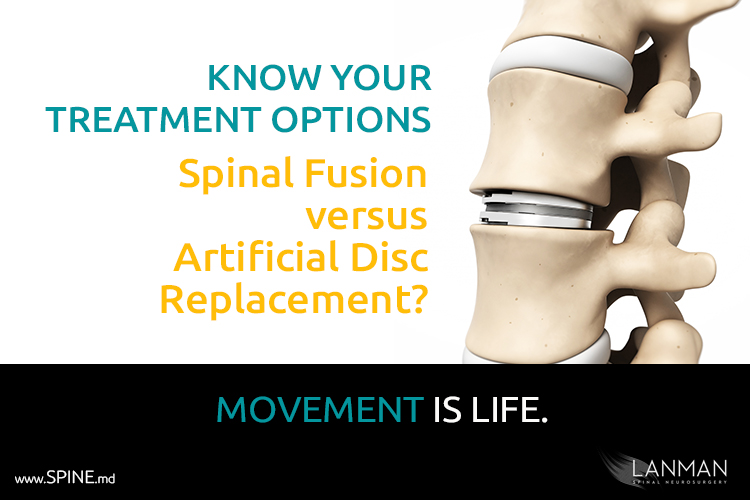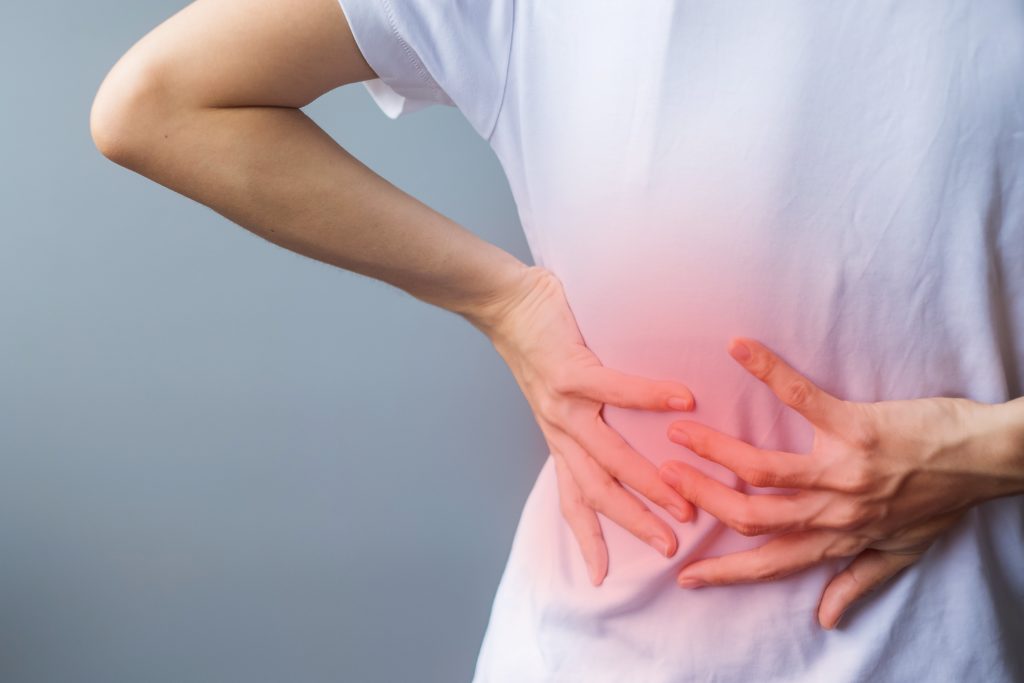Your body communicates distress through different symptoms, including pain. When something is wrong with your spine, you might feel pain radiating throughout your back. When something is wrong with your stomach, you could experience symptoms like nausea or bowel discomfort. However, it can be challenging to determine whether these symptoms are correlated or come from two separate issues.
Spinal conditions can affect the bowels and gastrointestinal distress can cause back pain. You might have one or multiple problems that need to be addressed. Your doctor’s goal is to learn what is causing your discomfort and how to treat it. Learn more about both of these conditions and how they affect each other.
Causes of Lower Back Pain
The first step in determining whether back and stomach pain are correlated is to get to the source of the issue. If you can figure out why your body is in a state of distress, you can take steps to address the issue and return to a state of comfort. Start with your lower back. Here are a few common causes of back pain that could cause long-term discomfort.
Injuries and Accidents
An accident can cause immediate lower back pain that persists for several weeks or months. This event also doesn’t have to be severe. You might walk away from a minor car accident and develop lower back pain a few weeks after the event. You could also tweak your back unexpectedly and feel the effects of the injury longer than you expect.
Consider a few reasons why you might experience lower back pain and tell your doctor about them. No event is too small to mention and could serve as a clue as to the cause of your discomfort.
Poor Posture and Lack of Exercise
There doesn’t need to be a single event that triggers back pain. Your lifestyle choices over time can affect your spine and cause pain. For example, if you slouch over your desk throughout the day, you could place extra pressure on your lower spine. After years of working in the same position, you could develop pain in your back. Other lifestyle factors, like a poor mattress or lack of exercise, could cause back pain.
If you meet with a doctor to talk about your back and stomach pain, they might ask about your lifestyle. They want to better understand where the pain is coming from.
Medical Conditions
Additionally, you could have a medical condition that is causing your back pain. Some medical conditions are completely out of your control and happen naturally. For example, you could have a worn-out spinal disc (degenerative disc disease) that is causing your vertebrae to grind against each other. You might have a herniated disc that is pushing into your nerves.
Your doctor will do their best to diagnose and treat these conditions to reduce your back pain.
Causes of Stomach Pain
After discussing your back pain, your doctor will take steps to better understand your stomach pain. They will try to understand what triggers your discomfort and what kinds of symptoms you live with. Here are a few causes of stomach pain.
Gastrointestinal Disorders
Many gastrointestinal disorders are actually linked to back pain. This is because the nerves of your bowels and intestines run through the lower part of the spine. When your digestive system is experiencing problems, you might feel lower back discomfort until your symptoms subside.
If you think you are visiting the doctor to discuss back pain, don’t be surprised if they want to talk about your diet and digestion. Do you experience frequent heartburn or GERD? Do you have frequent constipation, uncomfortable gas, or diarrhea? How does your gastrointestinal distress disrupt your life – and how long does it last? You could have a condition that causes back pain whenever you have a flare-up.
Infections
Your doctor also wants to rule out any bacteria, viruses, and other infections that could be affecting your digestive system. They will likely ask lifestyle questions about your job, hobbies, travel, family history, and home life. When an infection worsens, it can start to affect other areas of the body and increase your levels of discomfort.
Menstruation and Ovarian Cysts
If you have periods, your doctor might ask about the frequency, flow, and symptoms associated with menstruation. Every person who menstruates has a different experience; however, there are some flags that your period is worse than others. If you have extremely heavy periods, infrequent or sudden bleeding, long-lasting periods, or very painful periods, you may have an undiagnosed condition.
Your doctor might also consider the prospect of ovarian cysts, which can cause bowel discomfort, bloating, and back pain.
Diagnosis and Treatment of Back and Stomach Pain
Both your spine and your digestive system are complex parts of your body. Your doctor wants to know whether your symptoms are related and the best way to treat your pain so you can live a healthy lifestyle. Here’s what you can expect if you seek medical help for your discomfort.
Physical Exam and Medical History
Your initial meeting with your doctor will start with a discussion about your experiences. No detail is too small while explaining what you feel and when. Your doctor will ask a series of questions to get to know you in order to develop a diagnosis.
Remember, these are medical professionals who encounter similar conditions every day. You can speak freely about going to the bathroom and other bodily movements – even if it makes you uncomfortable at first. The more your doctor knows, the better chance they make an accurate diagnosis.
Along with learning about your conditions and medical history, your doctor might also perform a physical exam. They want to see how you move and where you specifically feel pain.
Imaging Tests
Your doctor might have a theory about why you are in pain, but they want to confirm the diagnosis. The next step is to receive a series of tests to look at the interior of your body. Your doctor might order imaging tests like x-rays, MRIs, and other scans to evaluate your spine and your bowels.
Testing is a big step on the road to treatment. Even when you start to recover, your doctor might order follow-up tests to confirm that your systems are improving and the on the path to good health.
Treatment Options
Once your doctor has a clear idea of what is causing your back and stomach pain, they will walk you through your treatment options. Most medical professionals provide a range of treatments and opportunities that depend on the needs of the patient.
For example, your treatment might be as simple as completing a few basic stretches and using a heating pad when you first experience discomfort. They might recommend changing how you sleep and adjusting your diet. From there, your doctor can list out other treatment options that can be completed if your symptoms become severe. In some cases, this might include surgery. However, your doctor wants to explore non-surgical options first to see how your body responds.
Prevention and Management of Lower Back and Stomach Pain
In the short term, your doctor wants you to feel better. In the long run, they want to prevent future flare-ups of any gastrointestinal distress and help you develop techniques for good spinal health. As you are on the road to recovery, your doctor should give you the tools to manage your condition and live a comfortable life.
Exercise and Stretching
Your doctor should recommend exercises that are appropriate for your lifestyle and physical condition. This might include low-impact activities like swimming or biking. They can also walk you through basic stretches that can improve your spinal health. In some cases, your doctor might recommend meeting with a physical therapist to learn more.
Maintaining Good Posture
Your spine supports you throughout the day and even when you sleep at night. Poor posture at your desk, in the car, and even while exercising can put pressure on your spine and cause long-term damage. Your doctor can help you take small steps to improve your overall posture to reduce pain and support your spinal health.
Stress Management Techniques
The human body responds to stress in a variety of ways. Some of your gastrointestinal distress could come from overwork or emotional stress responses. Your doctor will give you the tools to identify sources of stress and step away from them. This can benefit your mental and physical health.
Talk to Your Doctor About Any Pain You Experience
Very few medical conditions go away on their own. In fact, it’s more likely that your back and stomach pain will get worse if your condition is left untreated. If you experience frequent stomach or back pain, talk to a doctor. They can determine whether these symptoms are related and put you on a path to treatment. The sooner you get help, the sooner you can feel better.
If you live near Beverly Hills, Miami, or Palm Beach, request a consultation with Dr. Todd H. Lanman, a board-certified, award-winning spinal neurosurgeon. In your consultation, Dr. Lanman will perform a comprehensive exam to get to the root cause of your back pain and determine if there is a link to your gastrointestinal symptoms, so you can get back to living your life.







